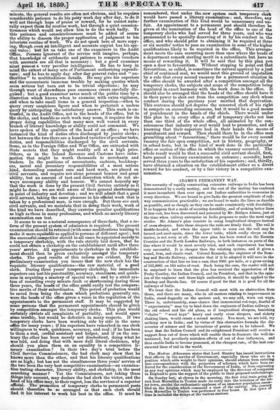ADAMS'S PERMANENT WAY.
THE necessity of rapidly constructing extensive railways in India has been demonstrated by a costly mutiny, and the cost of the mutiny has rendered it more incumbent than ever upon our Indian authorities to economise in every direction. We are bound to give India the greatest amplitude of rail- way communication practicable ; we are bound to make the lines as durable as possible, and as cheaply as they can be made consistently with durability. It sb happent that a mode of securing durability, and-of making better lines at less cost, has been discovered and patented by Mr. Bridges Adams, just at the time when railway enterprise in India proposes to make the most rapid strides. Mr. Adams's plan consists in using longitudinal sleepers instead of cross sleepers. Into these sleepers the rails are firmly fixed. The rail is double-headed, and when the upper table is worn out the rail may be turned and used again, since the lower table, which really sleeps on the timber, is not worn at all. The new plan has been tested on the Eastern Counties and the North London Railways, in both instances on parts of the line where it would be most Beverly tried, and each experiment has been very successful. It is cheaper than the existing system, and it gives a sound, firm, and elastic road. Colonel Kennedy, the engineer of the Bom- bay and Baroda Railway, estimates that if it be adopted it will save in the construction of that line no leas a sum than 930/. per mile, or a gross saving of 153,000/. on 161 miles of road. Such being the case, the reader will not be surprised to learn that the plan has received the approbation of Sir Proby Cautley, the Indian Council, and its President, and that in the opin- ion of the engineer and those high authorities, it should be applied to the Bombay and Baroda line. Of course if good for that it is good for all the railways of India.
We trust that the Indian Council will meet with no obstruction from those, and there are many, who in all matters relating to improvement in India, stand doggedly on the ancient and, wo may add, worn out ways. There is, unfortunately, some chance that immemorial red-tape, fearful of "experiments," may try to bind down the engineers of Indian railways to the old school and the old plans, as if longitudinal sleepers, banishing " chairs " "wood keys" heavy and costly cross sleepers, and rickety shaking lines, would create a second mutiny. You must, we are told, try nothing new in India ; and by virtue of this obstructive formula the dis- coveries of science and the inventions of genius are to be tabooed. We trust that the Indian Council and its enlightened President will receive a support from out of doors which will enable them to frustrate the well-in- tentioned, but peculiarly mistaken efforts of out of door influences, and thus enable India to become possessed, at the cheapest rate, of the best con- structed lines of rail in the world.
The Madras Athentrunt states that Lord Stanley has issued instructions that officers in the service of Government, especially those who are in a position which adds weight to their opinions, should abstain from entering into correspondence with the projectors of schemes which have been re- ferred for the consideration of the Government of India, or from expressing in any way opinions which may be employed by the directors of companies in England to gain the support of the public to their proposed undertakings. On Sunday last- at eleven in the morning, the first trial train going di- rect from Marseilles to Toulon made its entry into the terminus of the lat- ter town, amidst the enthusiastic applause of an immense population. asseme; bled on the heights which command a view of the railway. The journo _ from Marseilles to Toulon was performed in four hours. In that space r time is included the delays at the various stations.


























 Previous page
Previous page